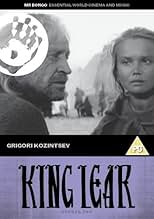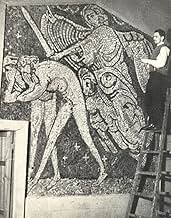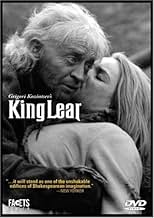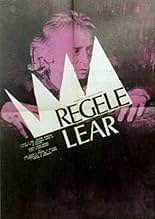VALUTAZIONE IMDb
8,0/10
1765
LA TUA VALUTAZIONE
Il re Lear, vecchio e stanco, divide il suo regno tra le sue figlie, dando grande importanza alle loro proteste d'amore per lui.Il re Lear, vecchio e stanco, divide il suo regno tra le sue figlie, dando grande importanza alle loro proteste d'amore per lui.Il re Lear, vecchio e stanco, divide il suo regno tra le sue figlie, dando grande importanza alle loro proteste d'amore per lui.
- Regia
- Sceneggiatura
- Star
- Premi
- 2 candidature totali
Jüri Järvet
- King Lear
- (as Yuri Yarvet)
Elza Radzina
- Goneril
- (as E. Radzina)
Galina Volchek
- Regan
- (as G. Volchek)
Valentina Shendrikova
- Cordelia
- (as V. Shendrikova)
Karlis Sebris
- Gloster
- (as K. Sebris)
Leonhard Merzin
- Edgar
- (as L. Merzin)
Regimantas Adomaitis
- Edmund
- (as R. Adomaytis)
Vladimir Emelyanov
- Kent
- (as V. Yemelyanov)
Aleksandr Vokach
- Cornwall
- (as A. Vokach)
Donatas Banionis
- Albany
- (as D. Banionis)
Aleksey Petrenko
- Oswald
- (as A. Petrenko)
Juozas Budraitis
- King of France
- (as I. Budraytis)
Recensioni in evidenza
10yavigad
Just finished watching the the 1971 version of Griogiri Kozintsev's King Lear and felt compelled to write my first ever IMDb review to recommend it to anyone who has the opportunity to see it. It was like stumbling across a rare treasure where not expecting it, and I just can't keep my mouth shut. I hadn't heard of the movie before and was doubtful about watching a dubbed version. This proved to be less of a distraction than I expected, and afforded me the opportunity of concentrating on the characterizations and visuals. It was an amazing interpretation of Shakespeare that brought to life the tragedy of Lear through sweeping scenery,breathtaking cinematography and Shakespearean acting as as good as any I've ever seen. I found the VERY Russian style invigorating after having watched countless BBC versions of Shakespeare. Not only did I get a greater appreciation for the original play, but by the last haunting scene I felt privileged to have watched a towering cinematic creation.
My Rating : 9/10
While I am not extremely well versed in Shakespeare and much less 'King Lear' I happily appreciated this interpretation.
There is a beautiful Soviet Union quality to it, the actors appearances, the harsh weather and conditions, the wild animals and the prose of Shakespeare make it a riveting and emotionally charged oeuvre of cinema.
A fine film indeed.
While I am not extremely well versed in Shakespeare and much less 'King Lear' I happily appreciated this interpretation.
There is a beautiful Soviet Union quality to it, the actors appearances, the harsh weather and conditions, the wild animals and the prose of Shakespeare make it a riveting and emotionally charged oeuvre of cinema.
A fine film indeed.
10dysandez
Back in high school, I had to watch this as we were studying King Lear in class.
Having watched both the Brooks and Olivier versions, I went in somewhat cautiously- I wasn't too fond of either, finding the Olivier version to be too colourful, and the Brooks version sombre.
This proved a sobering reminder of how truly spectacular cinematography can be if done correctly. This film gripped me like no other, and I watched riveted throughout.
The added Soviet focus on the peril of the peasant's, and the splendor of the palace helped to further heighten Lear's downfall. Chock-a-block full of brilliant performances, this has swiftly become one of my most treasured VHS tapes.
The only fault I could find was the somewhat tinny quality of the sound- but for a movie of the time, the quality was excellent.
A remarkable, truly moving film I recommend to everyone.
Having watched both the Brooks and Olivier versions, I went in somewhat cautiously- I wasn't too fond of either, finding the Olivier version to be too colourful, and the Brooks version sombre.
This proved a sobering reminder of how truly spectacular cinematography can be if done correctly. This film gripped me like no other, and I watched riveted throughout.
The added Soviet focus on the peril of the peasant's, and the splendor of the palace helped to further heighten Lear's downfall. Chock-a-block full of brilliant performances, this has swiftly become one of my most treasured VHS tapes.
The only fault I could find was the somewhat tinny quality of the sound- but for a movie of the time, the quality was excellent.
A remarkable, truly moving film I recommend to everyone.
Just as Beethoven's late piano sonatas and string quartets represent the Everest for musicians so Shakespeare's monumental roles of Hamlet, Othello, Coriolanus, Macbeth and King Lear present the ultimate challenge to those actors brave enough, and fit enough, to take them on.
The play 'King Lear' makes no concessions to the spectator and its cruelty, misery and dark despair are unrelenting. Not for the squeamish certainly.
The 'Hamlet' directed by Grigori Kozintsev in 1964 is universally considered the greatest Shakespearean film adaptation whereas opinions of his 'Lear' are more sharply divided.
Lear is played by Yuri Yarvet, an Estonian whose voice is dubbed and whose portrayal is that of an irascible and querulous old man with nothing of the 'King' about him at all but that is evidently the way the director wanted it. One cannot fail however to be impressed by his performance as a father driven to distraction by the realisation that none of his three daughters loves him. We know of course that his favourite daughter Cordelia has never ceased to love him but this he discovers all too late. Valentina Shendrikova is simply stunning as Cordelia as are Galina Volchek as Regan and Elsa Radzina as Goneril who had previously impressed as Gertude in 'Hamlet'.
The whole cast is uniformly excellent and Kozintsev has again benefited from the stunning images of cinematographer Jonas Gritsius and a powerful score by Shostakovich which is especially impressive in the storm sequence.
English speaking Bardolators will obviously regret the abridged text and the loss of the glorious verse but Nobel Laureate Boris Pasternak has done a wonderful job here in realising the director's vision of a fragile society on the verge of collapse. Michael Pennington likened watching 'Lear' to being cast adrift and looking for help. It is all so grim that when Albany tells Goneril :"You are not worth the dust which the rude wind blows in your face" one wants to stand up and cheer!
Shakespeare was a renowned adaptor and he has here taken an Elizabethan melodrama entitled 'King Leir' and given us a searing Jacobean tragedy. In the original Cordelia is spared and Leir regains his throne but here Cordelia's murder and her father's death are the final hammer blows and it is little wonder that Samuel Johnson found the ending almost unbearable.
The only two left standing are Albany and Edgar so there is at least a glimmer of hope. Ben Jonson declared that " Shakespeare is for all the ages" and Lear's observation that "when we are born we cry that we are come into this great stage of fools" just about sums up the human condition.
The play 'King Lear' makes no concessions to the spectator and its cruelty, misery and dark despair are unrelenting. Not for the squeamish certainly.
The 'Hamlet' directed by Grigori Kozintsev in 1964 is universally considered the greatest Shakespearean film adaptation whereas opinions of his 'Lear' are more sharply divided.
Lear is played by Yuri Yarvet, an Estonian whose voice is dubbed and whose portrayal is that of an irascible and querulous old man with nothing of the 'King' about him at all but that is evidently the way the director wanted it. One cannot fail however to be impressed by his performance as a father driven to distraction by the realisation that none of his three daughters loves him. We know of course that his favourite daughter Cordelia has never ceased to love him but this he discovers all too late. Valentina Shendrikova is simply stunning as Cordelia as are Galina Volchek as Regan and Elsa Radzina as Goneril who had previously impressed as Gertude in 'Hamlet'.
The whole cast is uniformly excellent and Kozintsev has again benefited from the stunning images of cinematographer Jonas Gritsius and a powerful score by Shostakovich which is especially impressive in the storm sequence.
English speaking Bardolators will obviously regret the abridged text and the loss of the glorious verse but Nobel Laureate Boris Pasternak has done a wonderful job here in realising the director's vision of a fragile society on the verge of collapse. Michael Pennington likened watching 'Lear' to being cast adrift and looking for help. It is all so grim that when Albany tells Goneril :"You are not worth the dust which the rude wind blows in your face" one wants to stand up and cheer!
Shakespeare was a renowned adaptor and he has here taken an Elizabethan melodrama entitled 'King Leir' and given us a searing Jacobean tragedy. In the original Cordelia is spared and Leir regains his throne but here Cordelia's murder and her father's death are the final hammer blows and it is little wonder that Samuel Johnson found the ending almost unbearable.
The only two left standing are Albany and Edgar so there is at least a glimmer of hope. Ben Jonson declared that " Shakespeare is for all the ages" and Lear's observation that "when we are born we cry that we are come into this great stage of fools" just about sums up the human condition.
This version of King Lear is an incredible achievement due to the masterful adaptation from the Shakespeare original by one of the best Russian poets, writers, and translators of the last century, Boris Pasternak; elegant and powerful images by the cinematographer Jonas Gritsius (he also worked with Grigori Kozintsev on the earlier Shakespeare's adaptation, "Hamlet", 1964), the music of Dimity Shostakovich, and the great performances from all actors.
Estonian actor Jüri Järvet is masterful as the mad king in a performance which is reminiscent of Kinski as another brilliant madman - Aguirre. They were even the same age when they played Aguirre and Lear. The whole cast is amazing: Kozintsev chose the best actors possible for his project and everyone delivers. I'd like to mention Oleg Dal as the touching Fool; Karl Sebris as the Duke of Gloucester, whose scenes with his son Edgar after having been blinded are very moving; Regimantas Adomaitis as Edmund, a treacherous son and brother but a brilliant man; and Donatas Banionis (who played the main character in Tarkovsky's Solaris) as an intelligent and noble Albany. But like I said, everyone and everything is just perfect in this little known but IMO, the Best adaptation of the beloved and one of the most wrenching tragedies in the English and in the world literature.
Estonian actor Jüri Järvet is masterful as the mad king in a performance which is reminiscent of Kinski as another brilliant madman - Aguirre. They were even the same age when they played Aguirre and Lear. The whole cast is amazing: Kozintsev chose the best actors possible for his project and everyone delivers. I'd like to mention Oleg Dal as the touching Fool; Karl Sebris as the Duke of Gloucester, whose scenes with his son Edgar after having been blinded are very moving; Regimantas Adomaitis as Edmund, a treacherous son and brother but a brilliant man; and Donatas Banionis (who played the main character in Tarkovsky's Solaris) as an intelligent and noble Albany. But like I said, everyone and everything is just perfect in this little known but IMO, the Best adaptation of the beloved and one of the most wrenching tragedies in the English and in the world literature.
Lo sapevi?
- QuizGrigoriy Kozintsev made this version of the play at the same time that Peter Brook was filming Re Lear (1970), and the two directors corresponded with each other throughout shooting.
- ConnessioniFeatured in King Lear (1987)
I più visti
Accedi per valutare e creare un elenco di titoli salvati per ottenere consigli personalizzati
Dettagli
- Tempo di esecuzione2 ore 20 minuti
- Colore
- Mix di suoni
- Proporzioni
- 2.35 : 1
Contribuisci a questa pagina
Suggerisci una modifica o aggiungi i contenuti mancanti



































